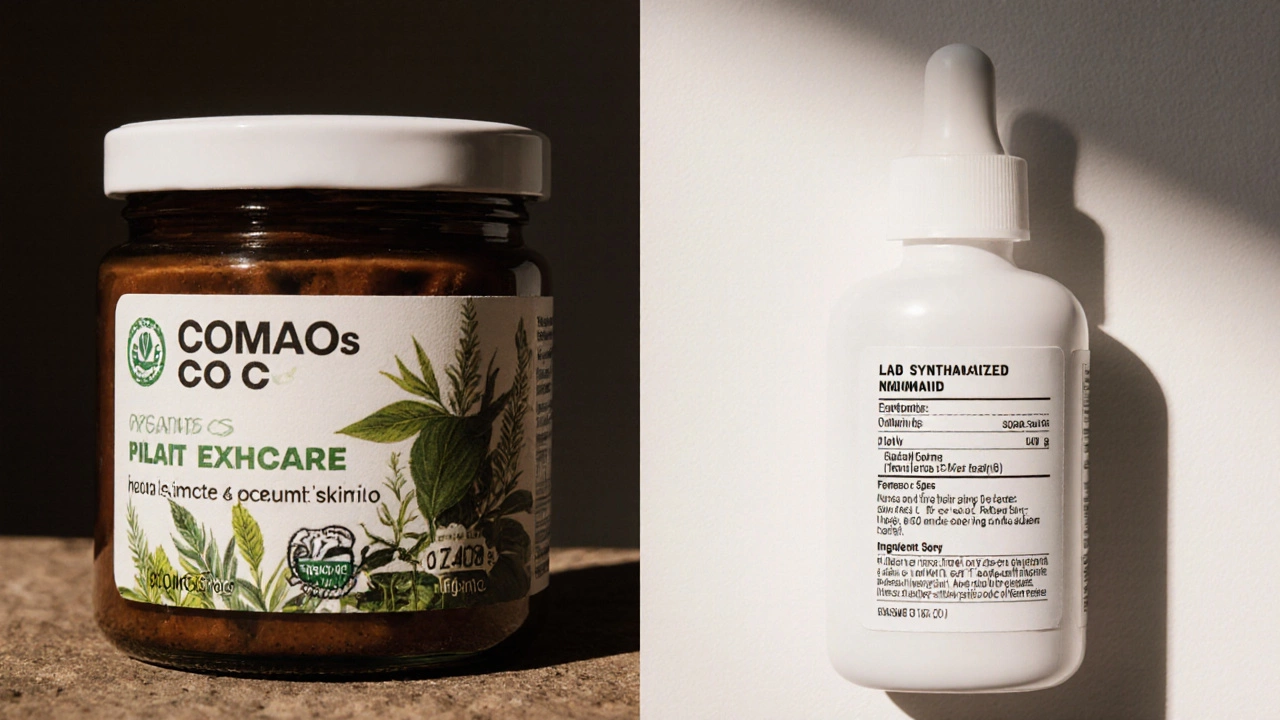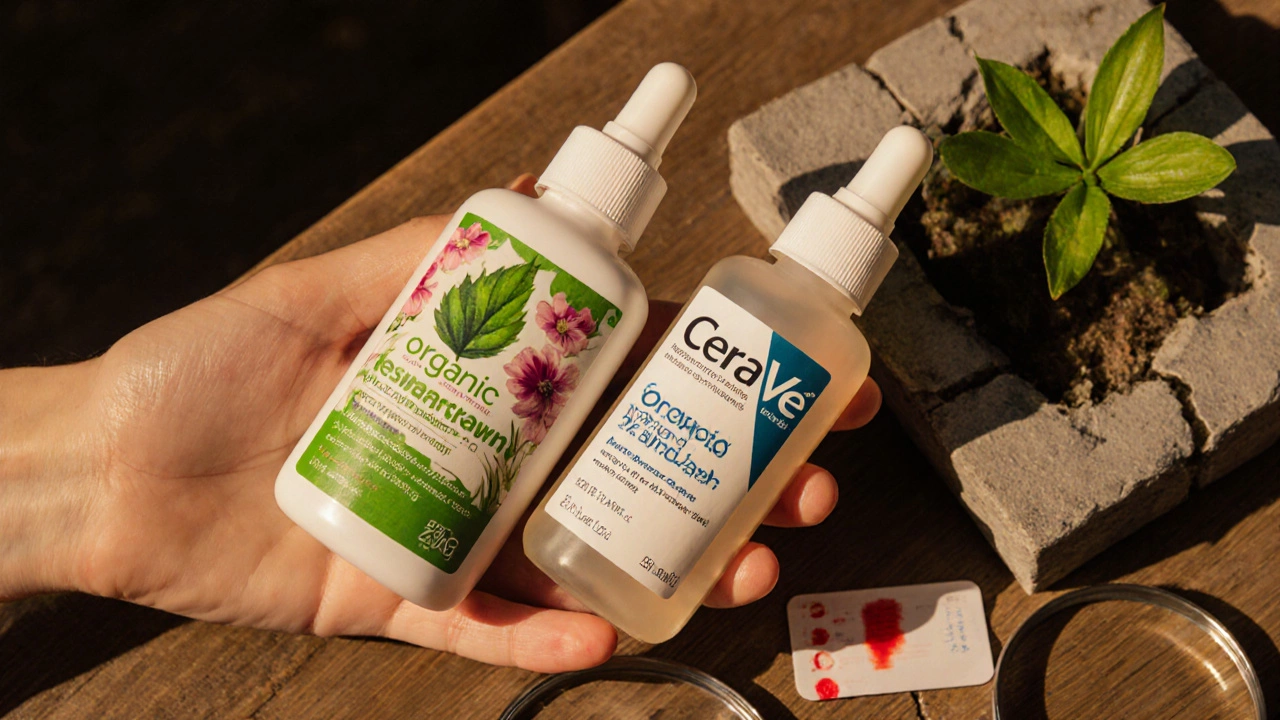
Skin Care Suitability Checker
Check Your Product's Suitability
Based on your skin type and ingredient concerns, we'll show if this product is likely to work for you.
Results
Ever stared at a bottle of "organic" face cream and wondered if it’s really any better than the drugstore stuff? You’re not alone. The organic skincare market has exploded in the last five years, with sales hitting $22 billion globally in 2024. But here’s the thing: just because a product says "organic" doesn’t mean it’s safer, gentler, or more effective. The truth is messier-and a lot more interesting.
What does "organic" even mean in skincare?
There’s no single legal definition for "organic" in skincare, unlike in food. In Australia, the term isn’t regulated by the Therapeutic Goods Administration (TGA) unless the product makes a therapeutic claim-like treating acne or eczema. That means any brand can slap "organic" on a label, even if 5% of the ingredients are organic and the rest are synthetic preservatives, fragrances, or silicones.
True organic certification comes from third-party bodies like COSMOS, USDA Organic, or ACO (Australian Certified Organic). These require at least 95% of agricultural ingredients to be organically grown, no synthetic pesticides, no GMOs, and no parabens or phthalates. But here’s the catch: many brands use the word "natural" interchangeably with "organic," and that’s not the same thing. Natural just means something came from a plant or mineral. It doesn’t mean it’s safe or non-irritating.
Take tea tree oil, for example. It’s natural. It’s also a common skin irritant. Or citrus extracts-they’re plant-based, but they can make your skin more sensitive to sunlight. Organic doesn’t automatically mean gentle.
Do organic ingredients actually work better?
Let’s cut through the hype. There’s no clinical evidence that organic ingredients are more effective than their synthetic counterparts at improving skin texture, reducing wrinkles, or fading dark spots. What matters is the concentration, formulation, and stability of the active ingredient-not whether it came from a farm or a lab.
Take vitamin C. You can get it from organic rosehip oil or from pure ascorbic acid synthesized in a lab. Studies show that lab-made ascorbic acid at 10-20% concentration is more stable and delivers faster results than plant-derived versions, which often contain less than 1% actual vitamin C. The same goes for hyaluronic acid: synthetic versions are purer, more consistent, and penetrate deeper than those extracted from fermented corn.
On the flip side, some plant extracts like centella asiatica, green tea polyphenols, and niacinamide (which can be naturally derived) have strong science backing them for calming inflammation, reducing redness, and strengthening the skin barrier. But again, the source doesn’t determine effectiveness-it’s the dose and delivery.
Where organic skincare actually wins: skin sensitivity and irritation
If you have sensitive skin, eczema, or rosacea, organic skincare might help-not because it’s "better," but because it’s often free of common irritants.
Synthetic fragrances are the #1 cause of allergic contact dermatitis in skincare. The European Union has banned over 1,000 fragrance ingredients. Many organic brands avoid them entirely, using essential oils instead. But even essential oils can trigger reactions. Lavender oil? Common allergen. Peppermint? Can burn. So it’s not about organic vs. non-organic-it’s about avoiding known triggers.
Preservatives are another big one. Conventional products often use parabens, phenoxyethanol, or formaldehyde-releasers to prevent bacteria growth. Organic brands tend to use potassium sorbate, sodium benzoate, or radish root ferment (a natural preservative). While these are generally milder, they’re not foolproof. Some people still react to them.
Here’s what actually works for sensitive skin: patch test everything. Use products with fewer than 10 ingredients. Avoid alcohol, essential oils, and fruit acids if your skin stings. And if you’re unsure, stick to brands that list all ingredients on the label and have been tested by dermatologists.

The environmental and ethical angle
Many people choose organic skincare because they care about the planet. And that’s valid. Organic farming reduces pesticide runoff, protects pollinators, and uses less water. Brands like Aesop, Lush, and The Body Shop (which sources many ingredients organically) invest in fair-trade partnerships and plastic-free packaging.
But here’s the blind spot: organic doesn’t mean sustainable. A product can be 100% organic and still come in a plastic tube shipped from France to Sydney. Carbon footprint matters more than whether the aloe vera was grown without chemicals.
Look for brands that combine organic certification with refillable packaging, carbon-neutral shipping, and waterless formulas. These are the real wins-not just the "organic" sticker on the jar.
What to look for instead of "organic"
Stop chasing labels. Start checking ingredients. Here’s what actually matters:
- Check the ingredient list: If water is first, then glycerin, then a long list of unpronounceable chemicals, you’re not getting a potent product-organic or not.
- Look for certifications: ACO, COSMOS, or USDA Organic. If it’s not certified, "organic" is just marketing.
- Know your irritants: Fragrance, alcohol denat., sulfates, and essential oils are common triggers-even in "natural" products.
- Check for active ingredients: Retinoids, niacinamide, ceramides, peptides, and hyaluronic acid have proven results. Doesn’t matter if they’re synthetic or plant-based.
- Test before you buy: Buy travel sizes. Patch test behind your ear for 48 hours. Your skin doesn’t care about your values-it only cares if it breaks out.

Real talk: Is organic skincare worth the price?
Organic skincare often costs 2-3x more than conventional brands. A 50ml serum might run $80. But here’s the reality: you’re paying for certification, ethical sourcing, and smaller production runs-not better results.
Compare this: a $25 niacinamide serum from The Ordinary (synthetic ingredients, no organic claims) has been shown in independent studies to reduce sebum production by 35% in 4 weeks. A $75 organic alternative might contain 0.5% niacinamide and 12 essential oils. Which one’s more likely to help your oily skin?
There’s no shame in choosing affordable, science-backed products. Many dermatologists recommend drugstore brands like CeraVe, La Roche-Posay, or Neutrogena for their proven formulas and minimal irritants. You don’t need to spend more to get better skin.
The bottom line
Organic skincare isn’t inherently better for your skin. It might be better for the environment. It might be better for your peace of mind. But when it comes to clearing acne, fading dark spots, or smoothing fine lines, science beats marketing every time.
Focus on ingredients you can verify. Avoid what irritates your skin. Choose products with proven actives-whether they’re lab-made or plant-derived. And if you love the smell of lavender and feel good about supporting organic farms? Go for it. Just don’t expect miracles.
Your skin doesn’t care if your cream is organic. It only cares if it works-and doesn’t make you break out.
Are organic skincare products really free of chemicals?
No. Everything is made of chemicals-even water and olive oil. "Chemical-free" is a marketing myth. Organic skincare avoids synthetic chemicals like parabens, phthalates, and artificial fragrances, but it still contains natural chemicals like citric acid, plant oils, and essential oils-which can also irritate skin.
Can organic skincare cause breakouts?
Absolutely. Many organic products use plant oils like coconut oil, almond oil, or jojoba oil, which can clog pores for some people. Essential oils like tea tree, citrus, or lavender are common irritants too. Just because something is natural doesn’t mean it’s non-comedogenic or non-irritating.
Is organic skincare better for acne-prone skin?
Not necessarily. Acne is best treated with ingredients like salicylic acid, benzoyl peroxide, or retinoids-all of which are synthetic. Some organic brands offer alternatives like tea tree oil, but studies show it’s less effective and slower to work. If you have acne, focus on clinically tested actives, not organic labels.
Do organic skincare products expire faster?
Yes. Without synthetic preservatives like phenoxyethanol or potassium sorbate, organic products often rely on weaker natural preservatives or antioxidants. This means they can spoil faster-especially if they contain water, plant extracts, or oils. Always check the PAO (period after opening) symbol and store them in a cool, dark place.
Should I switch to organic skincare if I have sensitive skin?
It can help-but only if you avoid known triggers. Many people with sensitive skin react to essential oils, even in organic products. Look for fragrance-free, hypoallergenic formulas, certified by dermatologists. Brands like CeraVe or La Roche-Posay offer gentle, affordable options that work better than many organic lines.
 Hair Care
Hair Care